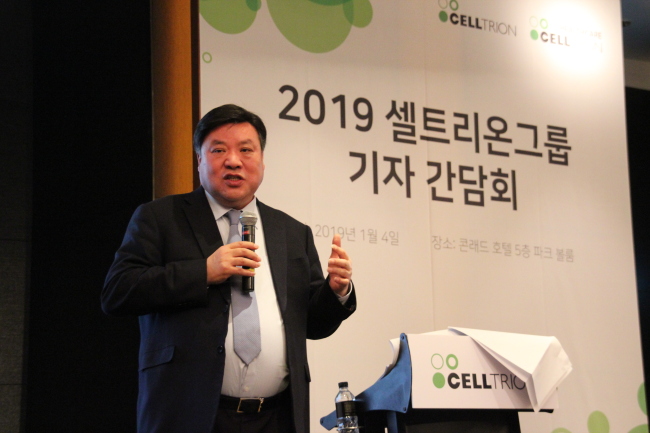Bio
Celltrion to directly sell Remsima SC, secure global distribution network
[THE INVESTOR] Korea’s leading biosimilar firm Celltrion will establish a direct sales network for its drugs worldwide, namely for its Remsima SC -- a subcutaneous version of Remsima – in an effort to secure price competitiveness and lead the global biosimilar market, its chief said in a New Year’s press conference last week.
The firm is also working toward opening a joint company in China within the first half of the year as part of the plan, said Celltrion’s founder and Chairman Seo Jung-jin.
 |
Celltrion’s Chairman Seo Jung-jin speaks at a press conference held on Jan. 4 at Conrad Hotel in Yeouido, Seoul. |
Apart from strategic partners, Celltrion will gradually hand over more sales control to its marketing and distribution arm Celltrion Healthcare by trimming down its sales partners in order to put the plan in motion for most countries by no later than July, he said. It has already been decreasing partner firms’ inventory since July last year.
Establishing its own sales network would allow Celltrion to gain an edge in pricing, which would help bring the company’s drugs to a wider population worldwide, and enable it to become a comprehensive pharma company that directly handles every process from research and development to manufacturing, sales and marketing to shipment, Seo said. Its primary goal for 2020 is to become a firm with a solid portfolio of both bio and chemical drugs and with a direct sales network.
Celltrion’s biosimilar drugs are currently sold in three steps. Celltrion is in charge of developing and producing the biosimilar drugs, which are then sold to Celltrion Healthcare, which then sells the drugs to distributors in each country for them to be sold to hospitals and pharmacies.
The distribution commissions go up to 40 percent of the average revenue for such drugs as Remsima.
“With Remsima SC, we will be directly selling it worldwide,” said Seo. Remsima SC is a subcutaneous version of Remsima, a biosimilar copy of Johnson & Johnson’s autoimmune disease treatment Remicade (infliximab) that can be self-injected into the fatty tissue under the skin. Remsima and Remicade require intravascular injections at hospitals. The company is waiting to receive an opinion from the European Medicines Agency’s new drug approval committee within the year, by October or November this year at the earliest.
Seo said the approval and sales of Remsima SC would be a turning point for Celltrion in positioning itself as a global bio firm.
“Setting up the direct sales system will not just end there but act as an expressway for local pharmaceutical companies in advancing overseas,” Seo said. “Celltrion newly established in people’s minds that South Korea is an important player in the health care industry.”
Underscoring that biomedicine has the potential to become one of South Korea’s major industrial engines, Seo added that he would retire as chairman without any hesitation by the end of 2020 if he fulfills such a goal.
“I will entrust the rest in the hands of my proteges and a professional business manager,” Seo said. “Having started as a salaried worker, up to this day I’m a company head, I realize that it’s important to know when to leave,” said the 61-year-old.
As part of its efforts to secure long-term manufacturing capacity, Celltrion is adding facilities to its first factory in Songdo to increase capacity by 50,000 liters and is planning to construct a third factory in Korea capable of producing 120,000 liters of drugs.
With Truxima, Remsima, Herzuma approved by the US’ FDA and Remsima SC’s pending EMA approval, Celltrion expects its growing portfolio will lead to increased manufacturing and increased sales. As global export volume goes up, Celltrion will continue to review building overseas plants, Seo said.
Celltrion is set to attend the 37th annual J.P. Morgan Healthcare Conference in the US from Jan. 7, where it will introduce its next-generation pipelines, including Remsima SC. The conference taking place in San Francisco, California, this week is the world’s largest and oldest health care investment symposium, where major pharma companies and global investors network.
Korean drugmakers invited to present at the conference’s Asia Track this year include LG Chem, Hanmi Pharmaceutical, Kolon TissueGene, Medytox, ViroMed, Handok, Kangstem Biotech and S. Biomedics. More pharma companies will meet with investors and potential partners during the health care conference.
Regarding his position on speculations of a merger between Celltrion and Celltrion Healthcare, Seo said such a move was up to the demands of the company’s shareholders.
By Lim Jeong-yeo/The Korea Herald (kaylalim@heraldcorp.com)








